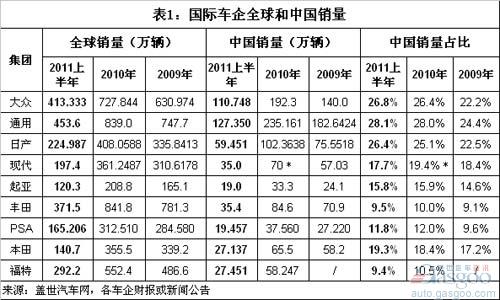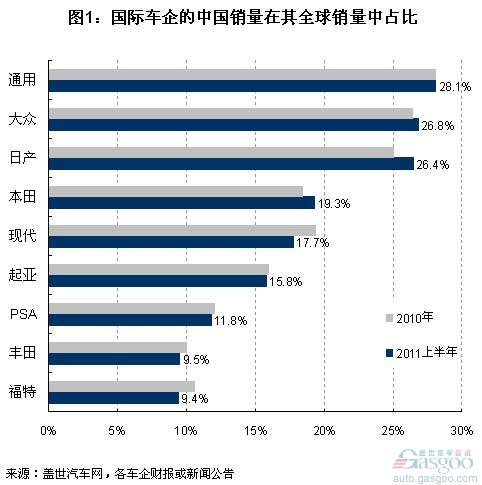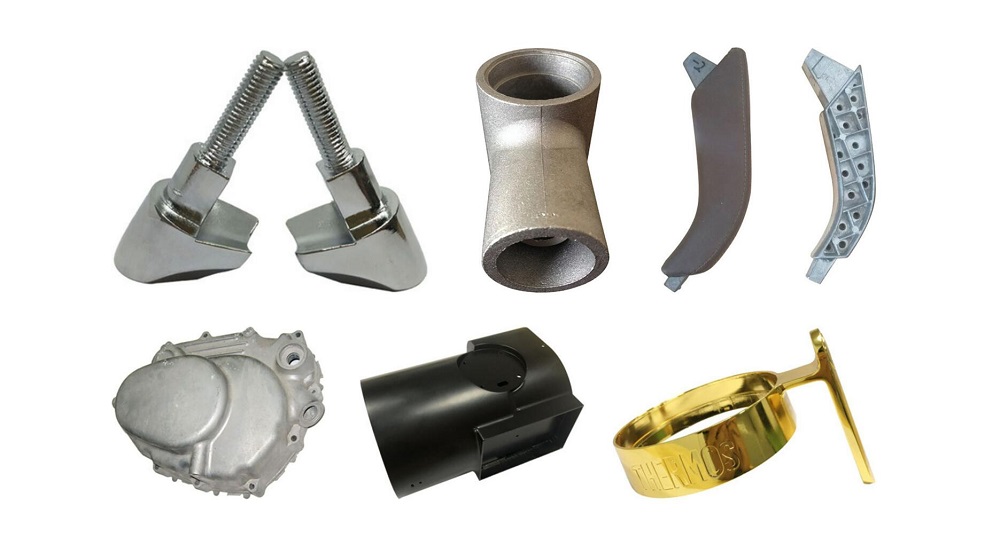

Volkswagen, GM, Nissan: China sales account for more than 1/4
For GM (including Wuling and FAW-GM sales), Volkswagen, and Nissan, China’s sales accounted for less than a quarter of its global sales in 2009, but China’s sales volume has accounted for four of its global sales since 2010. More than one point.
In 2010, General Motors Group's Wuling brand including SAIC-GM-Wuling and FAW-GM's total sales volume were 8.390 million, of which sales in China accounted for 28.0%, up 3.6 percentage points from the 2009 share (24.4%). In the first half of this year, this proportion rose slightly to 28.1%. If the Wuling brand and FAW-GM's sales are subtracted from GM's global sales and China's sales, GM's total global sales in 2010 will be approximately 7.15 million units, of which China's sales will account for 15.6%, and this proportion will rise to 16.4% in the first half of this year.
The Volkswagen Group's financial report showed that its total global sales volume (referred to as wholesale volume) in 2010 was 7.278 million, of which China sold 19.23 million vehicles, accounting for 26.4%, which was 4.2 percentage points higher than the 2009 share (22.2%). In the first half of 2011, the proportion of sales in China rose to 26.8% again.
Nissan Motors (excluding Renault) had global sales of 4,080,600 units in 2010, of which China's sales volume was 1,023,600 units, accounting for 25.1%, up 2.6 percentage points from 2009's share (22.5%). In the first half of 2011, the proportion of sales in China rose to 26.4% again.
Hyundai-Kia and Honda: China's sales accounted for between 15% and 20%. According to Hyundai Motor Co.’s announcement, Hyundai Motor’s (excluding Kia) global sales in 2009 and 2010 were 3.106 million units and 3.612 million units respectively; Its sales volume in China was 579,300 units in 2009, and it exceeded 700,000 units in 2010 (with no specific value). Therefore, the proportion of Hyundai Motor China sales in its global sales has increased from 18.4% in 2009 to more than 19.4%.
In the first half of 2011, according to Hyundai Motor Company's financial report, Hyundai Motor's sales in the world and China were 1.974 million and 350,000, respectively, and China's sales accounted for 17.7%.
According to Kia Motors Corporation’s financial report data, Kia's global sales volume in 2010 was 2.088 million, of which China’s sales volume was 333,000, accounting for 15.9%, which was 1.4 percentage points higher than the 2009 share (14.6%). In the first half of 2011, its sales volume in China slightly decreased to 15.8%.
Honda's total global vehicle sales in 2010 were 3.555 million, of which China's sales were 655,000, accounting for 18.4%, up 1.3 percentage points from the 2009 share (17.2%). In the first half of 2011, its sales volume in China further increased to 19.3%.
PSA China sales account for about 12%, Toyota and Ford are relatively lowest
PSA Peugeot Citroen Group's financial report showed that its total vehicle sales in 2010 (excluding CKD sales) was 3,215,100, of which China's sales volume was 375,600, accounting for 12.0%, which was an increase of 2.5 percentage points from the 2009 ratio (9.6%). In the first half of 2011, its sales volume in China slightly decreased to 11.8%.
Toyota’s financial report shows that its global sales in 2010 (referred to as retail sales) was 8.418 million vehicles (including Daihatsu and Hino). None of its sales in China have been listed in its earnings report or in the head office news bulletin. Toyota Motor (China) Investment Co., Ltd. released Toyota's 2010 sales of 846,000 vehicles in China, which accounted for 10.0% of Toyota's global sales, which was a 1.0 percentage point increase from the 2009 share (9.1%). In the first half of this year, Toyota's global sales (including Daihatsu and Hino) were 3.715 million, while Toyota China sold 354,000 vehicles, accounting for only 9.5%.
Ford Motor Company reported that its 2010 global sales were 5.542 million vehicles (including Volvo sales before sales), while Ford China released its sales in China 582,500 vehicles. From this figure, China’s sales accounted for 10.5% of its global sales. In the first half of this year, Ford sold 274,500 vehicles in China, which accounted for only 9.4% of its total global sales volume (2.92 million vehicles).
Note:
1. The sales volume of Japanese auto companies is the same as that of the calendar year/half year, not the fiscal year of Japanese auto companies.
2. The Volkswagen Group’s sales figures are derived from the vehicle sales shown in its financial report, which actually refers to the number of cars sold to dealers.
3. The GM Group’s global sales come from its financial report, and China’s sales come from GM’s announcement. Unless otherwise specified, its global and Chinese sales include sales of SAIC-GM-Wuling and FAW-GM.
4. Nissan’s sales refer to retail sales, and the data comes from its press release.
5. Hyundai Motor's global sales in the first half of 2011 and its Chinese sales came from the retail sales of its financial statements. Global and Chinese sales in 2010 and 2009 came from its press release, which stated that its sales volume in China in 2010 exceeded 700,000 vehicles, and no specific figures were specified. The modern 2010 financial report did not list China's sales. Hyundai Motor China official website shows: "In the Chinese region, Hyundai Kia Motors sold 1,093,071 vehicles a year, of which Hyundai Motors Kia Hyundai and Dongfeng Yueda Kia Motors sold 1,036,036 vehicles. Over 1 million sales targets were exceeded. In addition, modern imported vehicles and Kia imported vehicles also completed sales of 57,000 vehicles."
6. Honda sales, in addition to China's sales in the first half of 2011 from its press release, all come from its financial report.
7. Toyota's global sales data comes from the retail sales shown in its financial report (including sales of Daihatsu and Hino), and its sales data in China comes from sales performance reports released by Toyota Motor (China) Investment Co., Ltd. (Daifa and Hino sales should not include In)).
8. Ford’s global sales come from its financial report (including Volvo in 2010), and China’s sales come from wholesale data released by Ford China.
In the past, the use of magnesium alloy die castings was relatively small, and now it is slowly increasing. Because magnesium alloys have the characteristics of low density and strong rigidity, many parts of shells and brackets use magnesium die castings. For example, the fast-developing mobile phones and notebook computers in recent years often use magnesium die casting for the support frame and the back shell. However, compared with aluminum alloy die casting and zinc alloy die casting, the cost of magnesium alloy die-casting will be relatively high.
The melting point of magnesium alloy is relatively low, and it needs effective gas protection during die casting, which is easy to oxidize and burn. Therefore, the professionalism of die casting is relatively strong, and the requirements for die casting personnel are generally relatively high. SCZY has professional and technical personnel for die-casting magnesium alloy products to ensure the quality of the products. Including one-stop services such as precision CNC machining and surface treatment provided later.

Magnesium Die Casting,Magnesium Alloy Die-Cast,Magnesium Alloy Die Casting In Automobile,Magnesium Alloy Die Casting Processing,Magnesium Die Casting Parts
Shenzhen SCZY Technology Co.,Ltd , https://www.szcasting.com